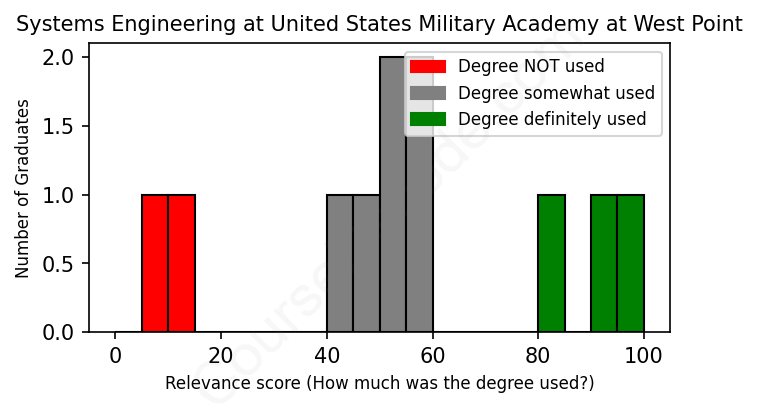
First, some facts. Of the Systems Engineering graduates from United States Military Academy at West Point we've analyzed , here's how many have used (or NOT used) their degree in their career:

These are estimates based on AI analysis of 11 LinkedIn profiles (see below).
The verdict? Significantly below average. Overall, with an average relevance score of 53%, Systems Engineering graduates from United States Military Academy at West Point have a much lower likelihood (-14%) of finding work in this field compared to the average graduate across all fields:
And for comparison, here's the chart for all profiles we've looked at across all degrees.
Also, after graduating, 45% of these graduates have pursued further education other than another Bachelor's degree (such as a Masters degree or other), compared to the average across all profiles of 35%. This suggests you may need more than just a Bachelors degree to be competitive as a Systems Engineering graduate.
See the details:
|
Relevance score: 50% We think this person has gone into a career only somewhat relevant to their degree. We think this person has gone into a career only somewhat relevant to their degree.
DEGREE INFOGraduated in 2022 from United States Military Academy at West Point with a Bachelor's degree in Systems Engineering. No other secondary education since. JOB HISTORY SINCE GRADUATIONSecond Lieutenant US Army May 2023 - Present ABOUTNo information provided. |
The top 10 most common jobs done by the graduates we've analyzed (ranked most common to least) are:
When looking at the career paths of graduates with a Systems Engineering degree from West Point, it seems like many end up in various roles within the military. A lot of them start out as officers in the Army, taking on roles like Platoon Leader, Company Commander, and different staff positions. While these positions can definitely benefit from some skills that are related to systems thinking—such as planning, problem-solving, and organization—they often do not specifically use the technical skills you'd learn in a Systems Engineering program. In short, there's a lot of overlap with skills like leadership and logistics, but less direct application of engineering principles.
In fact, while some roles do leverage analytical and technical skills, most of the jobs lean more toward military operations and leadership than actual systems engineering tasks. Other fields, such as teaching or athletics coaching, pop up too, which also don't tap into that engineering foundation. So, if you're looking at this data, it's clear that while the military background offers a variety of job opportunities, the connection to systems engineering expertise isn't always as strong as you might expect. Many of these roles harness leadership qualities, but they are often a step away from practical engineering applications.
Here is a visual representation of the most common words in job titles for Systems Engineering graduates (this is across all Systems Engineering graduates we've analyzed, not just those who went to United States Military Academy at West Point):

Graduates from the Systems Engineering program at the United States Military Academy at West Point tend to have significant and varied career trajectories that are closely tied to their military training. For most, the first job right after graduation is as a Lieutenant in the U.S. Army, which showcases the strong link between their education and immediate career path. Within a few years, they take on increasing levels of responsibility, often moving up the ranks to positions like Company Commander or Operations Officer. This pattern continues for about five to ten years, with many graduates becoming Captains or even Major level officers, involved in strategic roles or specialized programs, all while having their backgrounds in systems engineering inform their decision-making and operational planning.
That said, while many graduates remain within the military, where they can leverage their systems engineering knowledge, some explore opportunities in other fields like investment banking or education. There are also those who jump into entrepreneurial ventures. Overall, most people who've graduated from this program appear to be doing well, taking on impressive and relevant roles that utilize their technical training in varying capacities. The common theme is a strong foundation in leadership and systems thinking, making these graduates well-equipped for both military and civilian careers alike.
Getting a Bachelor’s degree in Systems Engineering at the United States Military Academy at West Point is definitely on the challenging side—like, expect a rigorous experience. You'll be tackling a mix of tough math, science, and engineering courses, along with military leadership training, which adds another layer of intensity. The workload can be pretty demanding, and you'll need to manage your time really well because you also have physical training and other responsibilities. So, while it might not be the hardest engineering degree out there, the combination of academics and the military environment makes it a bit tougher than your average college experience. If you're up for the challenge, it can definitely be rewarding!
Most commonly, in the LinkedIn profiles we've looked at, it takes people 4 years to finish a Bachelor degree in Systems Engineering.
Looking at these Systems Engineering grads from West Point, it seems like they've generally set themselves up for decent incomes, especially given their military backgrounds and the leadership roles they've taken on. Starting off as 2LTs in the Army, they’ve quickly moved up to positions like Company Commander or even Major, which typically come with solid salaries. Plus, some have landed roles in private sectors like investment banking or engineering, which can pay really well. Of course, the military pay isn't the highest compared to some civilian careers, but they’re gaining valuable experience that can translate to good money later on, especially if they choose to transition into corporate roles. So, yeah, it looks like they’re on a good path to making decent money!
Here is a visual representation of the most common words seen in the "about" section of LinkedIn profiles who have a Bachelor degree in Systems Engineering (this is across all Systems Engineering graduates we've analyzed, not just those who went to United States Military Academy at West Point). This may or may not be useful:

Here are all colleges offering a Bachelor degree in Systems Engineering (ordered by the average relevance score of their Systems Engineering graduates, best to worst) where we have analyzed at least 10 of their graduates:
| College | Score | Count |
|---|---|---|
 University of Arizona University of Arizona
|
73 | 11 |
 United States Naval Academy United States Naval Academy
|
71 | 11 |
 United States Military Academy at West Point United States Military Academy at West Point
|
53 | 11 |